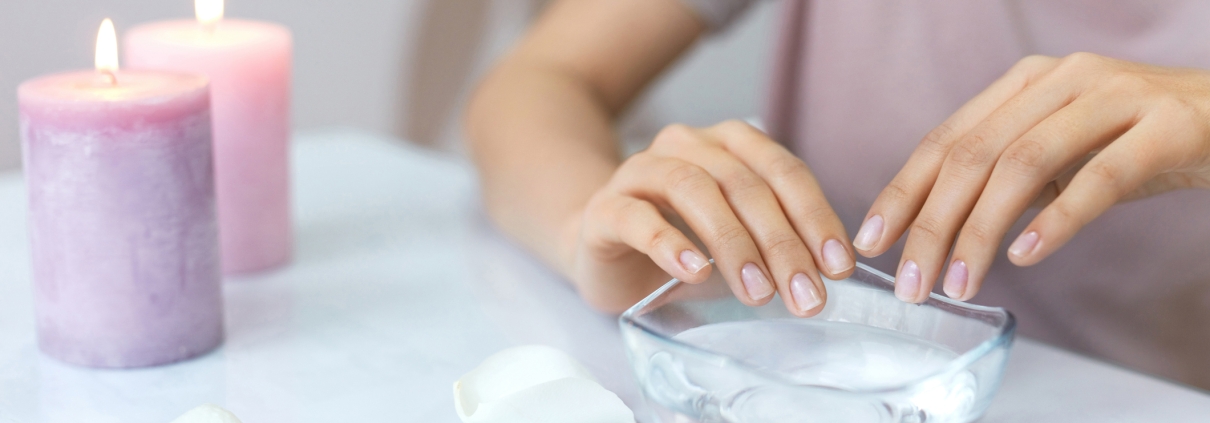Caring for Sensitive Nails
Caring for sensitive nails involves a gentle approach that minimizes further irritation. Here are some tips to help reduce sensitivity and strengthen nails:
1. Limit Exposure to Harsh Chemicals
- Avoid using acetone-based nail polish removers, and opt for acetone-free alternatives instead.
- Wear gloves when using cleaning products, washing dishes, or doing other activities that require chemical contact.
- Reduce the frequency of nail polish use to give nails time to “breathe.”
2. Moisturize Regularly
- Dryness contributes significantly to nail sensitivity, so moisturizing nails and cuticles daily can help keep them hydrated.
- Use a cuticle oil or hand cream that contains ingredients like vitamin E, jojoba oil, or shea butter, which help to nourish and protect the nail plate and surrounding skin.
3. Take Nutritional Supplements
- Consider taking a biotin supplement or a daily multivitamin containing essential minerals and vitamins like iron, zinc, and vitamin E.
- Consuming a balanced diet rich in protein, healthy fats, and leafy greens can support healthy nail growth and minimize sensitivity.
4. Choose Nail-Friendly Products
- Look for nail polishes and treatments specifically formulated for sensitive nails. These products are often free from harsh chemicals such as formaldehyde, toluene, and dibutyl phthalate (DBP).
- If you enjoy getting manicures, inform your technician about your sensitive nails, so they can avoid rough buffing or abrasive products.
5. Avoid Aggressive Nail Grooming
- Use a soft nail file and file in one direction to avoid weakening the nail plate.
- Avoid trimming cuticles aggressively, as this can damage the protective barrier around the nails and lead to infections or increased sensitivity.
6. Protect Nails from Temperature Extremes
- Extreme temperatures can make sensitive nails feel worse. Wear gloves in cold weather to protect your hands and nails from the drying effects of cold air.
- If you’re in a profession that requires frequent hand washing, consider using a gentle soap and applying hand lotion afterward.
Preventing Further Nail Sensitivity
Preventive care is key to maintaining healthy, resilient nails. Here are some strategies to keep sensitivity at bay:
- Take Breaks from Nail Treatments: Give your nails a break from polish, gels, or acrylics every few weeks to allow them to recover.
- Adopt a Nail-Friendly Diet: Nutrient-rich foods such as salmon, eggs, almonds, and leafy greens can help fortify nails from the inside out.
- Avoid Biting or Picking at Nails: Biting or picking at nails can introduce bacteria, cause trauma, and worsen nail sensitivity.
- Use a Humidifier: If you live in a dry climate or are frequently in air-conditioned environments, using a humidifier can help keep your nails from becoming overly dry and brittle.
When to See a Doctor
If your sensitive nails are accompanied by swelling, redness, severe pain, or signs of infection, it may be time to consult a healthcare provider or dermatologist. Conditions like nail fungus, psoriasis, or eczema can sometimes appear as nail sensitivity and may require specific treatments. Chronic nail sensitivity that doesn’t improve with home care may also indicate an underlying health condition, which a doctor can help diagnose and manage.
In Summary
Sensitive nails can be uncomfortable, but with the right care, you can reduce their fragility and restore strength. Proper hydration, protective measures, a nutritious diet, and careful grooming are the cornerstones of managing nail sensitivity. Small lifestyle adjustments—like wearing gloves when cleaning, taking breaks from nail polish, and using gentle products—can help protect your nails from damage and minimize discomfort.
If nail sensitivity persists, remember that it may be linked to a deeper health issue, and a healthcare professional can guide you toward effective treatments. Taking care of your nails not only improves comfort and appearance but also supports overall nail health in the long term.





